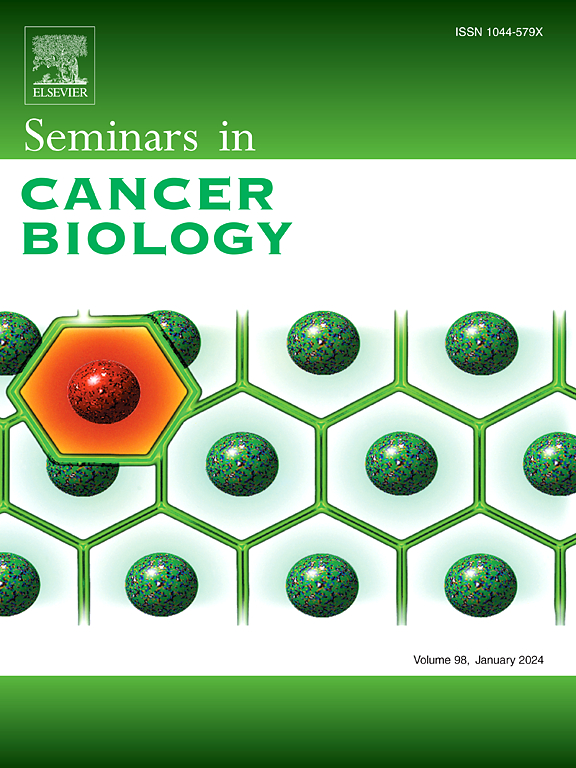The relationship of the microbiome, associated metabolites and the gut barrier with pancreatic cancer
IF 12.1
1区 医学
Q1 ONCOLOGY
引用次数: 0
Abstract
Pancreatic cancers have high mortality and rising incidence rates which may be related to unhealthy western-type dietary and lifestyle patterns as well as increasing body weights and obesity rates. Recent data also suggest a role for the gut microbiome in the development of pancreatic cancer. Here, we review the experimental and observational evidence for the roles of the oral, gut and intratumoural microbiomes, impaired gut barrier function and exposure to inflammatory compounds as well as metabolic dysfunction as contributors to pancreatic disease with a focus on pancreatic ductal adenocarcinoma (PDAC) initiation and progression. We also highlight some emerging gut microbiome editing techniques currently being investigated in the context of pancreatic disease. Notably, while the gut microbiome is significantly altered in PDAC and its precursor diseases, its utility as a diagnostic and prognostic tool is hindered by a lack of reproducibility and the potential for reverse causality in case-control cohorts. Future research should emphasise longitudinal and mechanistic studies as well as integrating lifestyle exposure and multi-omics data to unravel complex host-microbiome interactions. This will allow for deeper aetiologic and mechanistic insights that can inform treatments and guide public health recommendations.
微生物组、相关代谢物和肠道屏障与胰腺癌的关系
胰腺癌的死亡率很高,发病率也在不断上升,这可能与不健康的西方饮食和生活方式以及体重和肥胖率的增加有关。最近的数据还表明,肠道微生物组在胰腺癌的发病过程中发挥了作用。在此,我们回顾了有关口腔、肠道和肿瘤内微生物组的作用、肠道屏障功能受损、暴露于炎症化合物以及代谢功能障碍的实验和观察证据,这些都是导致胰腺疾病的因素,重点是胰腺导管腺癌(PDAC)的发生和发展。我们还重点介绍了目前在胰腺疾病方面正在研究的一些新兴肠道微生物组编辑技术。值得注意的是,虽然肠道微生物组在 PDAC 及其前体疾病中发生了显著变化,但由于缺乏可重复性以及病例对照队列中可能存在反向因果关系,因此肠道微生物组作为诊断和预后工具的作用受到了阻碍。未来的研究应强调纵向和机理研究,并整合生活方式暴露和多组学数据,以揭示复杂的宿主-微生物组相互作用。这将有助于深入了解病因和机理,为治疗提供依据并指导公共卫生建议。
本文章由计算机程序翻译,如有差异,请以英文原文为准。
求助全文
约1分钟内获得全文
求助全文
来源期刊

Seminars in cancer biology
医学-肿瘤学
CiteScore
26.80
自引率
4.10%
发文量
347
审稿时长
15.1 weeks
期刊介绍:
Seminars in Cancer Biology (YSCBI) is a specialized review journal that focuses on the field of molecular oncology. Its primary objective is to keep scientists up-to-date with the latest developments in this field.
The journal adopts a thematic approach, dedicating each issue to an important topic of interest to cancer biologists. These topics cover a range of research areas, including the underlying genetic and molecular causes of cellular transformation and cancer, as well as the molecular basis of potential therapies.
To ensure the highest quality and expertise, every issue is supervised by a guest editor or editors who are internationally recognized experts in the respective field. Each issue features approximately eight to twelve authoritative invited reviews that cover various aspects of the chosen subject area.
The ultimate goal of each issue of YSCBI is to offer a cohesive, easily comprehensible, and engaging overview of the selected topic. The journal strives to provide scientists with a coordinated and lively examination of the latest developments in the field of molecular oncology.
 求助内容:
求助内容: 应助结果提醒方式:
应助结果提醒方式:


